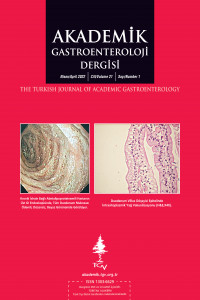Öz
Protein kaybettiren enteropati, plazma proteinlerinin lenfatik obstrüksiyon, sağ kalp basıncının arttığı kalp hastalıkları ve gastrointestinal sistemden kaybı ile karakterize nadir görülen bir hastalıktır. Primer intestinal lenfanjiektazi protein kaybettiren enteropatinin en sık nedeni olmakla birlikte Giardia intestinalis, Clostiridium difficile gibi pek çok parazitik enfeksiyonlar, inflamatuvar barsak hastalığı, çölyak, malignite, kardiyak hastalıklar ve kollajen doku hastalıklarının protein kaybettiren enteropatiye neden olduğu bilinmektedir. Clostiridium difficile antibiyotik ilişkili kolitin en önemli enfeksiyonlarından biri olup semptomatik ya da asemptomatik olabilir. Sulu ishal, karın ağrısı sık klinik bulgu iken bazı olgularda barsak duvarının enflamasyonu ve kolon lümeninin içerisine albümin sızması ile ilişkili olarak hipoalbüminemi ve ödem diğer klinik bulguları oluşturmaktadır. Bize antibiyotik kullanımı sonrası ishal, ödem kliniği ile başvuran, laboratuvar ve histopatolojik olarak lenfanjiektazi ile uyumlu saptanan olgu, protein kaybettiren enteropati olarak değerlendirildi. Az sayıda literatürde Clostiridium difficile enfeksiyonuna bağlı protein kaybettiren enteropati geliştiği bildirildiğinden bu olgu sunulmak istendi.
Anahtar Kelimeler
Protein kaybettiren enteropati Clostiridium difficile alfa-1 antitripsin lenfanjiektazi
Kaynakça
- 1. Weid der von YP. Lymphatic disorders. In: Walker WA, Goulet OJ, Mieli-Vergani G, et al, eds. Pediatric Gastrointestinal Disease: Pathophysiology, Diagnosis, Management. 6th ed. PMPH-USA; 2018:945-96.
- 2. Sullivan PB, Lunn PG, Northrop-Clewes CA, Farthing MJ. Parasitic infection of the gut and protein-losing enteropathy. J Pediatr Gastroenterol Nutr 1992;15:404-7.
- 3. Urganci N, Gulec SG, Kalyoncu D, Karaman S.Evaluation of paediatric patients with protein losing enteropathy a single centre experience. West Indian Med J 2013;62:186-9.
- 4. Dansinger ML, Johnson S, Jansen PC, et al. Protein-losing enteropathy is associated with Clostridium difficile diarrhea but not with asymptomatic colonization: a prospective, case-control study. Clin Infect Dis 1996;22:932-7.
- 5. Rybolt AH, Bennett RG, Laughon BE, et al. Protein-losing enteropathy associated with Clostridium difficile infection. Lancet 1989;1:1353-5.
- 6. McCollum DL, Rodriguez JM. Detection, treatment, and prevention of Clostridium difficile infection. Clin Gastroenterol Hepatol 2012;10:581-92.
- 7. Hookman P, Barkin JS. Clostridium difficile associated infection, diarrhea and colitis. World J Gastroenterol 2009;15:1554-80.
- 8. Kelly CP, LaMont T. Clostridium difficile infection. Annu Rev Med 1998;49:375-90.
- 9. Coté GA, Buchman AL. Antibiotic-associated diarrhoea. Expert Opin Drug Saf 2006;5:361-72.
- 10. Landzberg BR, Pochapin MB. Protein-losing enteropathy and gastropathy. Curr Treat Options Gastroenterol 2001;4:39-49.
- 11. Moyenuddin M, Williamson JC, Ohl CA. Clostridium difficile-associated diarrhea: current strategies for diagnosis and therapy. Curr Gastroenterol Rep 2002;4:279-86.
Öz
Protein-losing enteropathy is a rare disease characterized by lymphatic obstruction, heart disease with increased right heart pressure, and loss of proteins through the gastrointestinal tract. Although primary intestinal lymphangiectasia is the most common cause of protein-losing enteropathy, many parasitic infections such as Giardia intestinalis, Clostridium difficile, inflammatory bowel diseases, celiac diseases, malignancies, cardiac diseases, and collagen tissue diseases cause protein-losing enteropathy. Clostridium difficile is one of the most important causes of antibiotic-associated colitis, and it can be either symptomatic or asymptomatic. Although watery diarrhea and abdominal pain are common clinical findings, in some cases, hypoalbuminemia and edema are other clinical findings associated with inflammation of the intestinal wall and albumin leakage into the lumen of the colon.
The patient who presented to us with diarrhea and edema after using antibiotics, their case was found to be laboratory and histopathologically compatible with lymphangiectasia, and it was evaluated as protein-losing enteropathy. Here, we present this case because of the scant reports of protein-losing enteropathy caused by Clostridium difficile infection.
Anahtar Kelimeler
Protein-losing enteropathy Clostridium difficile alpha-1 antitrypsin lymphangiectasia
Kaynakça
- 1. Weid der von YP. Lymphatic disorders. In: Walker WA, Goulet OJ, Mieli-Vergani G, et al, eds. Pediatric Gastrointestinal Disease: Pathophysiology, Diagnosis, Management. 6th ed. PMPH-USA; 2018:945-96.
- 2. Sullivan PB, Lunn PG, Northrop-Clewes CA, Farthing MJ. Parasitic infection of the gut and protein-losing enteropathy. J Pediatr Gastroenterol Nutr 1992;15:404-7.
- 3. Urganci N, Gulec SG, Kalyoncu D, Karaman S.Evaluation of paediatric patients with protein losing enteropathy a single centre experience. West Indian Med J 2013;62:186-9.
- 4. Dansinger ML, Johnson S, Jansen PC, et al. Protein-losing enteropathy is associated with Clostridium difficile diarrhea but not with asymptomatic colonization: a prospective, case-control study. Clin Infect Dis 1996;22:932-7.
- 5. Rybolt AH, Bennett RG, Laughon BE, et al. Protein-losing enteropathy associated with Clostridium difficile infection. Lancet 1989;1:1353-5.
- 6. McCollum DL, Rodriguez JM. Detection, treatment, and prevention of Clostridium difficile infection. Clin Gastroenterol Hepatol 2012;10:581-92.
- 7. Hookman P, Barkin JS. Clostridium difficile associated infection, diarrhea and colitis. World J Gastroenterol 2009;15:1554-80.
- 8. Kelly CP, LaMont T. Clostridium difficile infection. Annu Rev Med 1998;49:375-90.
- 9. Coté GA, Buchman AL. Antibiotic-associated diarrhoea. Expert Opin Drug Saf 2006;5:361-72.
- 10. Landzberg BR, Pochapin MB. Protein-losing enteropathy and gastropathy. Curr Treat Options Gastroenterol 2001;4:39-49.
- 11. Moyenuddin M, Williamson JC, Ohl CA. Clostridium difficile-associated diarrhea: current strategies for diagnosis and therapy. Curr Gastroenterol Rep 2002;4:279-86.
Ayrıntılar
| Birincil Dil | Türkçe |
|---|---|
| Konular | Sağlık Kurumları Yönetimi |
| Bölüm | Makaleler |
| Yazarlar | |
| Yayımlanma Tarihi | 26 Nisan 2022 |
| Yayımlandığı Sayı | Yıl 2022 Cilt: 21 Sayı: 1 |
test-5


